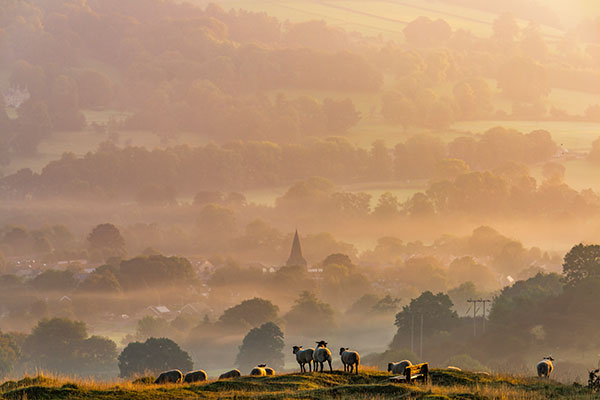As others pack their light summer reading for their holidays, The RSA Food, Farming & Countryside Commission is reading the stories from our UK tour and the write ups from our roundtable series.
And, taken alongside the increasingly concerned messages from rural experts - from NFU to Green Alliance, CLA to Prince's Countryside Fund, as well as this week's “Hothouse Earth” report, they do indeed make very interesting reading.
The UK Bike Tour is meeting people around the UK in countryside communities, food and farming sectors to talk to them about the issues that matter to them. The roundtables have invited industry experts from across food, farming, countryside, public health, economy, trade and international development, to comment on and help develop the Commission’s five key lines of inquiry – where Commissioners thought we could bring a distinctive contribution to current debates, or where we’d noticed that important issues were under-done, or voices unrepresented. The responses are rich, varied and creative.
A common thread runs through all the responses, from Westminster to the Western Isles. People are aware that potentially momentous change is taking place, and not just as the UK negotiates its exit from the European Union; they know this is complicated, uncertain and volatile. They realise that new choices will need to be made and things will change. What most concerns people though, is the current narrative trajectory. The idea that the UK government could end up with a catastrophic, no-deal Brexit is – without exception in our experience – a cause for alarm, and, some say, a serious abdication of leadership.
People we speak to – citizens around the UK as well as expert stakeholders at the roundtables – expect two things:
- For Government to do its job, to protect and promote the welfare of all its citizens, strengthened by the rigour of our Parliamentary system
- For citizens to be properly informed and engaged in the choices before them
A disorderly, no deal Brexit will make a thoughtful and thorough process exponentially harder. But people also recognise that talk of a ‘people’s vote’ or a second referendum is fraught with difficulty. Successive governments have failed to take into account the concerns of people away from the Westminster echo-chamber. As we’ve travelled far from Westminster, people in rural communities and market towns, as well as the cities we’ve dropped into on the way round, tell us that they feel distant from government policy making, that policy makers do not understand their concerns and they fear their voices will not be heard on the things that really matter to them. As Helen of Armagh Cider Company argues: “Those who believe no deal is better than a bad deal are not earning a living from the land.”
This cannot be remedied overnight. All serious commentators recognise that the choices ahead require deliberative, thoughtful, nuanced discussion, based on the best evidence we have, and weighing in the balance the interests of all parts of the UK, our global responsibilities and the needs of future generations. Nothing we do now is consequence free: deciding which choices and which consequences we want to manage next is the task at hand. We must take the time that’s needed to get the best possible outcome.
With that all said, and in the context of the Commission’s lines of inquiry, people tell us:
-
As the dramatic impacts of global challenges hit home – climate change, migration – it is more important than ever that the UK (the academic community, governments and NGOs) is able to maintain its place at the international table, to argue for principled and progressive policies, for living within planetary boundaries and meeting our global commitments.
-
Government should take a bolder stance, legislating if necessary, across food and farming policy, to ensure that healthy, affordable food is available for all, tackling the increasingly glaring connections between the public’s health and wellbeing and the food the UK grows, buys and eats, as well as the way we use green spaces for other benefits. People don’t see this as the “nanny state” but the Government doing its job to protect citizens from unnecessary harm.
-
It’s time the UK explored a systemic approach to land use – not a conventional ‘strategy’, but a framework that considers and balances the many services needed from this precious and pressured resource – from regenerating soils and biodiversity, through to land use for housing, energy, leisure and, of course, safe, secure food production.
-
The future of work in rural communities needs a fresh look. We know work is changing rapidly but what this means in a flourishing rural economy is under-explored - from the kinds of work people can and want to do, to the conditions needed to sustain meaningful and decent work – connectivity, safe and accessible services and affordable housing.
-
When government talks about public money for public goods there’s much more to talk about than just a reformed CAP system. Public value is created (or depleted) by more than just the public spending in rural economies; private and NGO money plays f a huge, often under-scrutinised, role. People tell us that mapping that whole resource at community level, as well as developing a better sense of what nurtures social capital - the resilience and creativity that holds communities together - and working towards aligning all resources towards creating public value is overdue and essential.
Tackling these big and important questions requires serious, deliberative processes. People around the UK are already exploring thoughtful, practical and creative responses to them in their businesses and in their communities.
Over the next few weeks, we’ll be publishing further pieces from the roundtables and our other inquiries, in preparation for the interim report in October. We’ll also outline the next stage of the Commission’s plans, to involve people, communities and stakeholders in some practical proposals to help tackle the critical challenges of our time.
Related articles
-
Finding the road to renewal
Sue Pritchard
New poll by FFCC and the Food Foundation finds 85% of people want to see some of the personal or social changes they have experienced during Covid-19 continue afterwards, whilst just 9% want everything to go back to how it was before the pandemic.
-
Counting on recovery: collecting the data to inform policy post-crisis
Tom MacMillan
We’re starting to gather evidence on community responses to the pandemic, to help shape post-crisis policy. If you are too, let’s team up.
-
The Future is Here
Sue Pritchard
In a rapidly changing world, we need a stubborn optimism for the future.



Join the discussion
Comments
Please login to post a comment or reply
Don't have an account? Click here to register.
The food and farming sector is far from alone in regarding leaving the EU with no deal as unimaginable but now having to be contemplated as a real and frightening possibility. It is becoming clear that we are going to run out of time to achieve any outcome that could be regarded as acceptable even if our political leaders were to behave completely rationally from now on (profoundly welcome though that would be).
I think it will be essential for the application of Section 50 to be suspended to allow more time. I have no doubt that the 27 would permit this if they saw any prospect of its leading to a constructive outcome.
'No-Deal' is or should be very much a runner, and this needs to be made clear to the Commission. If there is a true possibility of our walking away with no deal, the EU will be very concerned and will start to negotiate seriously - something it has cleverly avoided doing for about a year. The settlement proposed by Theresa May, and now being sought by HMG, would leave us in the worst of all possible worlds. No voice in decision-making, acceptance of regulations laid down by other bodies, no enhanced control of borders, no ability to complete Free Trade Agreements with other countries, substantial divorce payments and the continuing jurisdiction of the European Court of Justice. That is a recipe for disaster. 'No Deal' would be far better. The first two or three years after Brexit were always going to be rocky. The extent of this will depend on how much the EU-27 member states agree to let the Commission undermine their interests in having practical solutions which preserve their interests too. In any case, withdrawal from the EU is not primarily an economic issue governed by forecasts of plus or minus a few % points of GDP growth, but a political one, based the simple idea of independence from a nascent and undemocratic superstate.